|
|
|
Sort Order |
|
|
|
Items / Page
|
|
|
|
|
|
|
| Srl | Item |
| 1 |
ID:
108797


|
|
|
|
|
| Publication |
2011.
|
| Summary/Abstract |
This article examines the differing meanings of volunteering that underlie the management of volunteers in diverse cultural contexts by analyzing a case study of an Australian non-government organization (NGO) working in Papua New Guinea (PNG), where local volunteers are engaged in a number of its programs. The results indicate that gift-exchange theory may be a fundamental influence shaping attitudes towards volunteering by PNG nationals. This has led to the development of a gift-exchange model to assist other Western-based NGOs to manage formal volunteering in Pacific nations in a way that is both effective and culturally appropriate.
|
|
|
|
|
|
|
|
|
|
|
|
|
|
|
|
| 2 |
ID:
119918
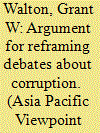

|
|
|
|
|
| Publication |
2013.
|
| Summary/Abstract |
There have been few attempts to identify the way different perspectives of corruption are employed in Papua New Guinea (PNG). The paucity of such analysis makes it difficult to identify the way scholars and policy-makers understand corruption in the country, in turn leading to potentially poor targeting of anti-corruption programmes. This article categorises perspectives of corruption that are found in academic and policy accounts of PNG. It finds that this literature is marked by an over-reliance on 'mainstream' Western interpretations of the definition, causes and solutions to corruption. In turn, it is argued that there is an important role that 'critical' and culturally aware academics can play in reframing debates about corruption in PNG and the Pacific.
|
|
|
|
|
|
|
|
|
|
|
|
|
|
|
|
| 3 |
ID:
120196
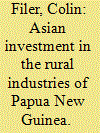

|
|
|
|
|
| Publication |
2013.
|
| Summary/Abstract |
One part of the Australian colonial legacy in PNG is the Australian government's attempt to forge partnerships with different groups of foreign companies in different economic sectors in order to lay the economic foundations for rural development in the newly independent nation. American and Australian capital was invited to develop the mining industry, European capital to develop the oil palm industry, and Japanese capital to develop the forest industry. Nowadays, the Australian government seems to have forgotten its late colonial enthusiasm for this form of state capitalism, and its aid to PNG is largely framed by the neo-liberal policy prescriptions which the World Bank was able to impose on the PNG government through a sequence of structural adjustment programs beginning in 1990. However, members of PNG's national political elite have persistently sought refuge from this economic orthodoxy through their engagement with Asian governments and companies. In this paper I examine the way in which changing political and economic conditions have affected the actual pattern of Asian investment in PNG's forestry and agriculture sectors, and the way in which different stakeholders have responded to this changing pattern of investment. Despite the prevalence of a policy narrative which holds Asian investors responsible for the corruption of PNG's political institutions when mineral resource booms liberate national politicians from the constraints of Western economic orthodoxy, I show that Asian investment in these two sectors has taken several different forms, and there is no simple sense in which PNG's national economy and political system are subject to a concerted takeover by Asian business interests.
|
|
|
|
|
|
|
|
|
|
|
|
|
|
|
|
| 4 |
ID:
106704
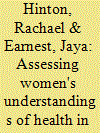

|
|
|
| 5 |
ID:
061003
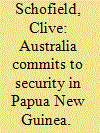

|
|
|
| 6 |
ID:
120198
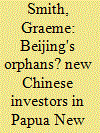

|
|
|
|
|
| Publication |
2013.
|
| Summary/Abstract |
This paper will explore the perspectives and narratives developed by three different sets of Chinese investors in Papua New Guinea (PNG): investors in the retail, mining, and construction sectors. It is estimated that 90 per cent of new Chinese private investors in the PNG retail sector hail from Fuqing, a coastal community in Fujian province with a long history of transnational migration. Larger state-owned mining ventures and construction companies draw on a more disparate workforce, even though they are headquartered in Beijing. All three sets of investors face different degrees of stigmatization from their competitors, the media, and different Chinese and local actors. Based on interviews with Chinese investors in PNG and China, and drawing on Chinese scholarly studies, this paper will explore the interaction of these three groups of investors with Chinese state and non-state actors, and evaluate how this shapes the process of "localization." The paper will examine how relations with state and non-state actors in PNG are evolving over time, as both groups find ways to "get things done" in a country where mainland Chinese investors have a short history of engagement.
|
|
|
|
|
|
|
|
|
|
|
|
|
|
|
|
| 7 |
ID:
163352
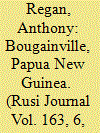

|
|
|
|
|
| Summary/Abstract |
This article asks whether the experience of a successful peace process such as the one that has brought more than 20 years of peace to Bougainville offers lessons for other peace processes. Anthony Regan shows that while the strong emphasis in the cultures of Bougainville and of Papua New Guinea on reconciliation as a means of ending conflict cannot be readily replicated, an aspect of the peace process that could be considered for use elsewhere is the Peace Agreement offering implementation incentives to opposing parties.
|
|
|
|
|
|
|
|
|
|
|
|
|
|
|
|
| 8 |
ID:
111173
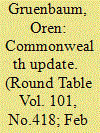

|
|
|
|
|
| Publication |
2012.
|
| Summary/Abstract |
Militant Islamists terrorised Nigeria, killing hundreds in indiscriminate attacks. The Bangladesh army said it had foiled a coup attempt, while in Pakistan the army seemed closer to launching a coup itself. New Zealand's leader won a second term, Jamaica and Guyana elected new ones, but rival prime ministers vied for power in Papua New Guinea. Fiji lifted martial law. South Africa saw a global deal to combat climate change agreed in Durban but the government was criticised for resurrecting apartheid-era controls over the media. A Malaysian judge threw out a sodomy case against the opposition leader Anwar Ibrahim that was widely seen as politically motivated, and the Federated Farmers of New Zealand called for sheep shearing to become an Olympic sport.
|
|
|
|
|
|
|
|
|
|
|
|
|
|
|
|
| 9 |
ID:
121663
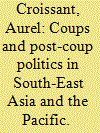

|
|
|
|
|
| Publication |
2013.
|
| Summary/Abstract |
The 2006 coups in Fiji and Thailand-as well as the 2012 incident in Papua New Guinea-have sent timely reminders that military coups remain a threat to vulnerable democracies in South-East Asia and the Pacific. This article explores the interplay between structural factors that can create coup risks, the 'coup-proofing' strategies of political leaders and the occurrence of military coups. While the article examines the region as a whole, it pays particular attention to Myanmar (Burma), Thailand, Indonesia, Fiji and Papua New Guinea. Borrowing from the work of Belkin and Schofer, it argues that the level of coup risk in each country can be assessed by analysing the extent of regime legitimacy, the strength of civil society and the frequency of military coups in the past. By combining this analysis with an evaluation of coup-proofing strategies, the study discusses likely scenarios for the five focus countries as far as the likelihood of coups or, alternatively, the establishment of stable civilian control is concerned.
|
|
|
|
|
|
|
|
|
|
|
|
|
|
|
|
| 10 |
ID:
168267
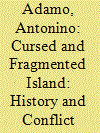

|
|
|
|
|
| Summary/Abstract |
This paper is a review piece examining the main factors responsible for the civil war, lasting from 1988 to 1998, on Bougainville island, an autonomous region in Papua New Guinea. History, economy, and social aspects of the island – especially traditional society features, mining activities, the effects of colonization and industrialization – are highlighted. The aim of the article is to identify which factors best explain the outbreak of the conflict. The main assumption is that no single factor can explain the civil war, as these elements require a comprehensive analysis. The ‘resource curse’ theory, i.e. the presence of natural resources leading to economic failure, and the existence of ethnic cleavages, are proposed as explanations, although further factors must also taken into account. Finally, the analysis helps to contextualize the unfolding events in Bougainville and its path to democratization.
|
|
|
|
|
|
|
|
|
|
|
|
|
|
|
|
| 11 |
ID:
178283


|
|
|
|
|
| Summary/Abstract |
Papua New Guinea’s first deep-sea mining project, once touted as the first of its kind in the world, now appears to be “dead in the water.” The mining company behind it has been liquidated, the mining equipment has been rendered obsolete, and the host government has been made to look foolish for supporting the enterprise. This paper examines the application of two concepts—that of the “resource frontier” and that of the “actor-network”—to reach an understanding of the history of this apparent failure. By elaborating on the additional concept of a “network junction,” it seeks to show how arguments about the feasibility or fallibility of this particular project, and deep-sea mining proposals more broadly, have been related to arguments about a range of other issues in which scientific and technological uncertainties are associated with environmental and social impacts or environmental and political risks. Instead of seeking to explain the failure of this project by reference to the attributes of a specific type of maritime resource frontier, the paper shows how the articulation of different policy networks creates the appearance of a frontier in which human and non-human actors have combined to produce a variety of unpredictable and open-ended outcomes. From this point of view, the history of this project’s failure cannot simply be read as the outcome of a contest between two groups of human actors with clearly defined interests or ideologies, nor does it necessarily spell the end of the policy network in which this project has been embedded.
|
|
|
|
|
|
|
|
|
|
|
|
|
|
|
|
| 12 |
ID:
152523


|
|
|
|
|
| Summary/Abstract |
Most resettlement in the Pacific, whether for political, economic or environmental reasons, has been in some respects unsuccessful, often resulting in land disputes, social conflicts, marginalisation, impoverishment and return migration. Resettlement after volcanic eruption poses particular problems because of necessary immediacy, temporal uncertainty over the duration of the displacement and the wish of most of those displaced to return, when possible. The eruption of the Manam Island volcano in 2004–2005 displaced over 9000 people to the nearby mainland. Successful resettlement, one of the largest necessitated in the Pacific region, has proved difficult, resulting in land disputes, violence, disease and inertia, as a consequence of 10 years of government inability to achieve a permanent resettlement plan or enact a plan. Despite formal opposition, and intermittent volcanicity, many Manams have chosen to return to the island. The Manam Islanders' experience provides a warning about the complex challenges inherent in population resettlement in only subtly different cultural, geographical and political contexts.
|
|
|
|
|
|
|
|
|
|
|
|
|
|
|
|
| 13 |
ID:
168451
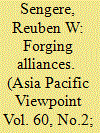

|
|
|
|
|
| Summary/Abstract |
Partnership discourse is making advances in development dialogue as a means to improve the livelihoods of the agrarian populace. In Papua New Guinea, productive partnerships flourished during the early growth of the coffee industry. After the demise of plantations and rural mills in the lead up to political independence, the support services that plantations used to provide to smallholders, including centralised processing, have ceased as have price incentives for quality. Consequently, smallholders began to produce coffee of inconsistent quality and their productivity has also declined. However, coffee value chain partnerships have the potential to reverse the present decline of coffee production and increase the productivity of coffee farmers and address the inconsistency and the supply of low‐grade coffee. Using two case studies of farmer cooperatives, we investigate collective action and also assess partnerships among present value chain actors. The case studies were supported with interviews of value chain actors to gain further insights into partnerships with farmer groups. This paper illustrates that through collective action and partnerships, coffee farmers can improve coffee production and quality, enhance governance systems in grower groups, attract community development services and diversify into other entrepreneurial activities.
|
|
|
|
|
|
|
|
|
|
|
|
|
|
|
|
| 14 |
ID:
095245
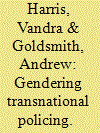

|
|
|
|
|
| Publication |
2010.
|
| Summary/Abstract |
This article explores the issues encountered by Australian women police officers on international peace keeping and capacity-building deployments in Timor-Leste, the Solomon Islands and Papua New Guinea. The discussion draws upon the literature on transnational policing as well as on women's participation in domestic police forces. The women police interviewed for this research encountered challenges working with colleagues from both the host nation and other contributing forces. The most commonly reported difficulties, however, stemmed from the behaviour of some of their Australian colleagues. These experiences point to the risk that a small number of male Australian police are reverting to a macho culture on international missions. The symbolic as well as practical implications of any kind of 'gender reversion' are likely to be significant.
|
|
|
|
|
|
|
|
|
|
|
|
|
|
|
|
| 15 |
ID:
175029


|
|
|
|
|
| Summary/Abstract |
Premised on our contention about the narrowness of the contemporary, industry-centric, focus to understanding the causes for the underdeveloped state of electricity industry in PNG, this paper develops a governance perspective for facilitating such an understanding. The analytical framework employed for this purpose is informed by core tenets of the state-society relational theory. The analysis undertaken in this paper suggests that the development of electricity industry in PNG has been ad hoc in nature, typified by the prevalence of piecemeal efforts for redressing electricity issues of the time. Further, this ad hoc development is essentially reflective of the underlying crisis of governability, as indicated by persistent political instability and frequent changes of government. This crisis has arisen from the ubiquity of conflicts, at the local level, between the western-style formal governance framework adopted after independence, and the culturally-attuned informal governance framework that has existed in the local communities for centuries. In such environments, the government tends to focus on redressing the immediate threat of political survival. The question of long-term development of the country (including, electricity industry development) has therefore assumed a dormant role. Outcome is the persistence of underdevelopment of the electricity industry.
|
|
|
|
|
|
|
|
|
|
|
|
|
|
|
|
| 16 |
ID:
128816
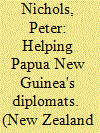

|
|
|
| 17 |
ID:
152695
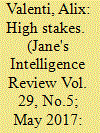

|
|
|
| 18 |
ID:
078537
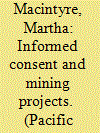

|
|
|
|
|
| Publication |
2007.
|
| Summary/Abstract |
Free, prior and informed consent is increasingly perceived as a means of ensuring that people's human rights are respected and their interests protected. This paper explores issues arising in the context of gaining informed consent about mining projects from people who are citizens of a developing nation. Assumptions about rights, processes of negotiation, scientific knowledge and environmental degradation are often alien to the local people involved. Drawing on anthropological research in Papua New Guinea, the complex interactions between understandings of scientists, environmentalists, corporation managers and indigenous people are examined. The pragmatic problems of ensuring that informed consent is gained and that the human rights of local people are equitably protected are explored and some tentative solutions offered
|
|
|
|
|
|
|
|
|
|
|
|
|
|
|
|
| 19 |
ID:
143535


|
|
|
|
|
| Summary/Abstract |
Research on Solomon Islands and Papua New Guinea typically offers one of two explanations for the choices voters make, and the way these choices contribute to those countries’ poor political governance. The first explanation focuses on culture’s influence on the expectations that voters hold of politicians, contending that the Big Man style of local leadership traditionally found in both countries has shaped voter expectations in ways that cause voters to demand local or personal benefits issue_image_89_1_Wood2from MPs rather than good national governance. The second explanation hinges on rational choice models of voter behaviour and does not include culture in its list of explanatory variables. In this paper I argue that neither explanation fits well with key features of these countries’ politics. Drawing on quantitative and qualitative data I show that, while voters are broadly rational and can readily distinguish modern politics from traditional leadership, culture still matters. In particular, informal institutions, associated with the countries’ cultural contexts, influence voter behaviour and electoral collective action, and through this political governance
|
|
|
|
|
|
|
|
|
|
|
|
|
|
|
|
| 20 |
ID:
074534


|
|
|
|
|
|
|
|